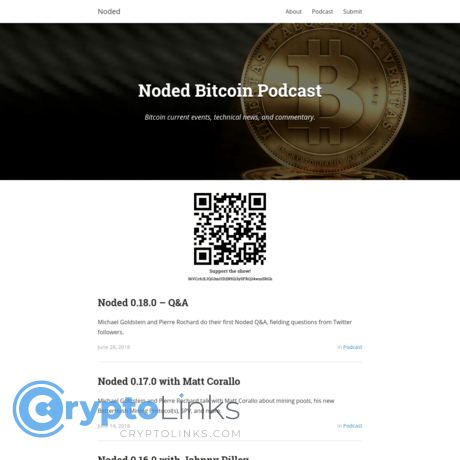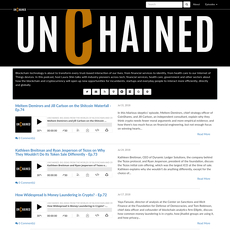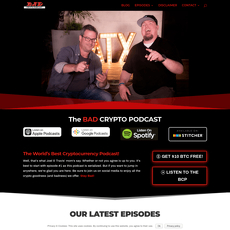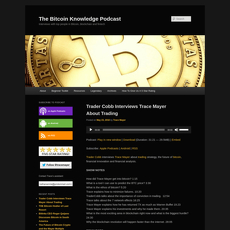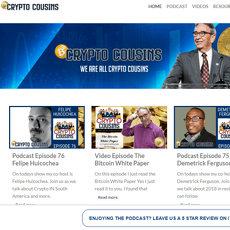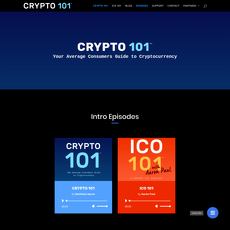Noded Bitcoin Podcast Review
Noded Bitcoin Podcast
noded.org
Noded Bitcoin Podcast (noded.org) Review Guide: Everything You Need To Know + FAQ
Thinking about adding another Bitcoin show to your queue—but not sure if Noded is worth your time?
I put Noded under the microscope so you can decide fast. I’m talking real signal, no fluff: what the show is actually about, who it’s best for, the must-hear angles, how often new episodes land, how it stacks up against other Bitcoin podcasts, and quick answers to the questions people keep asking. Short, practical, and honest—exactly what I look for before I hit subscribe.
The problem: too many Bitcoin podcasts, not enough signal
Let’s be real—there are a lot of “Bitcoin” podcasts. Some are hype machines. Others assume you already know everything. Release schedules swing from daily spam to radio silence. You want clear Bitcoin-only content that respects your time and actually makes you smarter.
- Hype vs. substance: A slick thumbnail doesn’t equal strong ideas.
- Wrong difficulty: Either beginner fluff or PhD-level jargon, with nothing in between.
- Inconsistent cadence: It’s hard to build a habit when episodes arrive at random.
- Mixed signals: “Crypto” creep dilutes Bitcoin-first learning.
- Time sinks: Two hours of talk for five minutes of insight isn’t a good trade.
This isn’t just a gut feeling. Choice overload is real—classic research by Iyengar & Lepper showed that more options often lead to worse decisions and less satisfaction. Podcasts are no different: endless choice can push you to pick the loudest show, not the best one.
My goal: cut through the noise and answer one thing—does Noded deserve a slot in your listening queue?
My promise: a clear, useful verdict you can act on
I’ll explain what Noded is, who’s behind it, how it sounds, how often new episodes drop, and the kind of insights you can expect. I’ll also point you to where to listen, who will love it (and who won’t), and the closest alternatives if the style isn’t your thing. No fanboying. No dunking. Just a straight, actionable verdict.
What I’ll cover and how I tested
I listened across the Noded archive, checked noded.org for episode notes and links, verified availability on major podcast players, and compared it with Bitcoin staples in my rotation. Here’s the bar I use:
- Signal-to-noise: Do conversations move the ball forward without filler?
- Bitcoin-only rigor: Is it grounded in first principles rather than trend-chasing?
- Evergreen value: Will an episode still teach you something six months later?
- Time-to-insight: How quickly do you get to a clear idea you can use?
- Production and pacing: Solid audio, smart pacing, minimal distractions.
- Listening ergonomics: Easy to find, easy to follow, easy to queue.
When I test a Bitcoin podcast, I look for specifics that matter: do they define key terms when it helps (UTXO, mempool, node), challenge weak narratives, and stick to Bitcoin’s monetary properties instead of drifting into trading chatter? Do episodes feel like timeless notes you’ll want to re-listen to—or just timely takes that age fast?
Ready to see what Noded actually is, who hosts it, and whether the tone fits your style? That’s up next—want the quick lay of the land before you press play?
What is the Noded Bitcoin Podcast?
Noded is a Bitcoin-only show hosted by Pierre Rochard and Michael Goldstein (aka Bitstein) that treats Bitcoin like a serious monetary revolution—not a passing trend. Expect conversations that blend philosophy with tech, always circling back to self-sovereignty, economic reasoning, and why running your own node matters. It’s the kind of show that makes you think twice about assumptions, then gives you the tools to verify them yourself.
“Don’t trust, verify.”
Hosts and DNA
I like that the hosts don’t posture. They’ve been around, they’ve put skin in the game, and they care about the principles that protect users. You’ll hear a Bitcoin-first worldview that cuts through noise and resists shortcuts.
- Pierre Rochard — Early evangelist for node sovereignty and sound-money thinking. He’s known for popularizing running your own node and for clear-headed, no-shortcuts commentary on Bitcoin’s monetary properties.
- Michael “Bitstein” Goldstein — Co-founder of the Satoshi Nakamoto Institute, where archival work and essays connect Bitcoin to economic history and Austrian economics. He’s sharp, sarcastic when needed, and laser-focused on Bitcoin’s cultural backbone.
Their chemistry is grounded in first principles. You’ll hear skepticism toward hype, scams, and sloppy thinking—paired with a genuine respect for the boring, reliable parts of Bitcoin that actually keep it working.
Format and topics
It’s a conversation-driven show. No gimmicky segments, no clickbait framing—just two seasoned Bitcoiners exploring the things that actually matter to the network and to users. Common threads include:
- Monetary properties: fixed supply, credible commitment, and why hardness beats “innovation theater.”
- Node operation: how full nodes enforce rules, what “sovereignty” means in practice, and why verification beats trust.
- Security assumptions: proof-of-work incentives, fee markets, and what happens as subsidies decline across halving cycles.
- Scaling trade-offs: base layer vs. second layers like Lightning, what to keep minimal, and where complexity belongs.
- Culture and ethics: minimizing custodial risk, resisting yield-chasing, and the social norms that keep Bitcoin anti-fragile.
Real example angles you’ll hear: the lessons from 2017’s user-activated soft fork, why “your keys, your coins” is more than a slogan, and sober takes on energy narratives (with an emphasis on verifiable data—think the kind of sources you’d find via the Cambridge Centre for Alternative Finance, not Twitter hot takes). Industry research, like ongoing work highlighted by Edison Research on podcast listening behavior, also helps explain why their evergreen approach works—concept-first shows age far better than newsy ones, and that shows up in listener retention over time.
Release cadence and archive health
Here’s the trade: the schedule isn’t weekly. You might see stretches of quiet followed by a new drop. But the archive at noded.org holds up because the content is built on principles, not headlines. I find myself re-listening months later and catching things I missed—especially on the incentives and node-sovereignty side. That re-play value is the payoff.
If a show is this focused on first principles, what does it actually feel like to listen—tone, pacing, and production? That’s exactly what I’ll unpack next, including whether you’ll need a notepad or you can enjoy it on a walk without feeling lost.
Listening experience: tone, depth, and production
Noded feels like pulling up a chair to a high-signal Bitcoin conversation where assumptions get challenged and weak ideas don’t survive. It’s confident, principled, and refreshingly free of filler. You’ll hear first-principles reasoning, not cheerleading—and that’s exactly why it sticks.
“Don’t trust, verify.” That’s the North Star here—applied to money, incentives, and your own understanding.
Style and difficulty
The tone is direct and thoughtful. There’s no handholding, but it’s not a wall of jargon either. If you’ve got the basics—keys, nodes, proof-of-work, supply schedule—you’ll be right at home. If you’re newer, you can still follow along; you’ll just pause now and then to check a term.
- What it sounds like: rigorous but human. You’ll hear “UTXO,” “mempool,” and “trust minimization,” then a quick pivot into why those ideas matter for real people, not just devs.
- What helps most: a simple mental model of how Bitcoin transactions flow and how your node enforces the rules. Cognitive load research suggests that having a basic map in mind makes complex audio easier to remember—and this show rewards that kind of prep.
- Real sample moments: a conversation may unpack why verification beats reputation, compare running your own node vs. relying on block explorers, or weigh base-layer finality against second-layer convenience without turning it into a hype reel.
Episode length and structure
Expect medium-to-long conversations, usually one continuous thread rather than segmented bits. That free-flow structure works well for weighty topics—ideas get time to breathe, and you aren’t jolted between segments just as it gets good.
- Typical rhythm: begin with a core principle (e.g., “rules, not rulers”), walk through technical or economic implications (how nodes keep you sovereign, how incentives align), then explore cultural knock-on effects (why narratives matter, where trade-offs bite).
- Why it works: long-form talk remains one of the most consumed podcast formats in the US, according to recurring industry research (Edison Research’s Infinite Dial). When the subject is complex, more runway usually means better retention.
Audio quality and site usability
Production is clean, with consistent levels and minimal distraction. You’ll occasionally hear the “remote guest” texture, but voices are clear and the signal remains strong. No blaring intro, no over-produced fluff—just the conversation.
The site at noded.org keeps it simple: episodes, notes, and a fast player that works. Titles make it obvious what you’re getting into, and the pages load quickly, which matters if you’re jumping between shows on mobile data.
Where to listen and subscribe
Grab episodes at noded.org or add the RSS to any podcast app you like. It’s available on the usual suspects—Apple Podcasts, Spotify, Overcast, Pocket Casts—and any RSS-friendly player.
- Quick tip: use your app’s variable speed and bookmarks. For idea-dense shows like this, 1.2–1.5x with quick bookmarks beats mindlessly blasting through at 2x.
- Another tip: treat standout segments as “chapters” in your notes app—one line per idea. It’s the easiest way to turn listening into actual understanding.
Want an exact queue of episodes that match where you’re at—newer, intermediate, or advanced—so you get the most value right away? That’s coming next. Ready for a starter playlist that respects your time?
Start here: building your Noded starter playlist
You don’t have to listen in order. The smartest way to get value fast is to build a mini playlist around your current focus—sovereignty, running a node, monetary history, or clearing up common misunderstandings. Use the archive at noded.org and search for keywords that match the themes below.
“Don’t trust, verify.”
If you’re newer to Bitcoin
Go for episodes that answer the “why” behind Bitcoin and the basics of verification. You’ll get the most traction by sticking to first principles.
- Node 101: Look for conversations about why full nodes matter, how they enforce the rules, and what “self-sovereignty” really means. Keywords: full node, verification, sovereignty.
- Bitcoin vs “crypto”: Episodes that contrast Bitcoin’s fixed supply, decentralization, and security with casino-style tokens. Keywords: hard money, monetary policy, altcoins.
- Proof-of-work basics: Anything explaining why PoW secures the network and aligns incentives, not just the energy headlines. Keywords: PoW, security model, incentives.
- Keys and ownership: Talks that clarify private keys, addresses, and why custody is an economic decision. Keywords: keys, custody, not your keys.
Pro tip: Re-listen to strong, evergreen episodes one day later and again a week later. The spacing effect (Ebbinghaus) shows repeated exposure boosts retention over time. Quick primer: Ebbinghaus Forgetting Curve.
Make it stick: Jot down two sentences after each listen on what changed in your understanding. Research suggests generative note-taking improves conceptual learning (see Mueller & Oppenheimer’s work on note-taking efficiency: paper).
Your first 4-episode arc:
- Why verification beats trust
- What makes Bitcoin sound money
- Proof-of-work without the hype
- Keys, custody, and the cost of convenience
If you’re intermediate or advanced
When you already know the basics, aim for episodes where the hosts wrestle with trade-offs. That’s where Noded shines.
- Scaling and incentives: Fee markets, block size constraints, and why throughput isn’t the same as security.
- Second layers: Lightning’s liquidity, channel economics, and where it fits (and doesn’t) in the stack. Keywords: Lightning, channels, liquidity.
- Validation and soft forks: Activation paths, rule changes, and keeping validation cheap. Keywords: soft fork, activation, validation rules. Useful companion: Bitcoin BIPs.
- Privacy and UX trade-offs: Coin selection, address reuse, wallet defaults, and realistic threat models.
- Miner economics: Halvings, revenue mix, security budget, and long-term sustainability.
Pro nerd trick: Keep the Bitcoin Developer Guide handy while listening. Pausing to check a concept compounds learning—active engagement beats passive listening every time.
Evergreen themes that age well
These topics hit just as hard years later; they pass the Lindy test.
- Proof-of-work’s role in security and incentive alignment
- Verification over trust and why nodes are the ultimate referees
- Sound money, scarcity, and time preference
- Incentive design and unintended consequences
- Cultural norms: self-sovereignty, minimal trust, antifragility
If an episode is anchored to principles rather than a headline, it tends to compound in value. That’s the Lindy effect in action: the longer an idea has survived, the longer it’s likely to remain useful.
How to spot less essential listens
Short on time? Filter ruthlessly.
- Skip time-capsule news: If the description revolves around last month’s price, a specific exchange hack, or a fleeting drama, archive it for later or let it go.
- Favor principles: Pick episodes with keywords like first principles, incentives, verification, nodes, security model.
- Use the 30-second test: Read the show notes. If 80% of the bullets are news-of-the-week, it probably won’t age well.
Fast-start playlist templates
- The 90-Minute On-Ramp: 1) Why nodes matter → 2) Bitcoin vs “crypto” → 3) Proof-of-work, plain English
- The Builder’s Pack: 1) Validation rules and soft forks → 2) Lightning liquidity realities → 3) Fee markets and incentives
- The Sovereignty Set: 1) Keys and custody risks → 2) Privacy assumptions → 3) Economic narratives of hard money
Want the most impact per minute? Stack a principles episode with a technical one, then re-listen a week later. The spacing effect does the heavy lifting while you sleep.
Now the real question: is this lineup actually built for you—or is there a better fit for your style? Up next, I’ll break down who gets the most from Noded and who should reach for a different feed.
Who will love Noded (and who won’t)
Some shows entertain. This one sharpens your thinking. If “Don’t trust, verify” feels less like a slogan and more like how you approach money, tech, and sovereignty, the Noded Bitcoin Podcast will land right in your sweet spot.
“Don’t trust, verify.” —the ethos that keeps Bitcoin honest
Ideal listener profile
- You’re Bitcoin-first. Multi-coin chatter bores you; you want signal, not token-of-the-week noise.
- You enjoy first-principles thinking. Monetary history, incentives, and security assumptions are your jam.
- You value sovereignty. Running your own node, minimizing trusted third parties, and holding your own keys matter.
- You’re patient with cadence. You don’t need a daily drop; you want conversations worth replaying.
- You’ve got some basics down. If terms like PoW, consensus, and supply schedule are familiar, you’ll squeeze a lot more value out of each episode.
Real-world example: if you’ve ever migrated from a custodial wallet to your own setup, priced hardware for a home node, or argued with a friend about why verification beats reputation, this podcast will feel like home.
Standout strengths
- High signal on fundamentals. Discussions stick to the foundations that don’t age out quickly—perfect for re-listens.
- Credible hosts with a long memory. The show rewards listeners who want context, not hype cycles.
- Evergreen value. Episodes on proof-of-work, node sovereignty, and economic incentives stay useful years later.
Why this matters: research on podcast habits (see Edison Research’s long-running Infinite Dial reports) shows listeners return to shows they learn from and trust. Long-form, idea-rich episodes build that trust. Noded fits that pattern—less flash, more substance, and higher retention over time because the ideas keep paying you back.
Limitations to know
- Not a step-by-step tutorial. You’ll understand the why; for the how, you’ll still want a hands-on guide.
- Sporadic releases. Don’t expect a weekly rhythm. Think “quality library,” not “news feed.”
- Zero trading talk. If you’re looking for calls, charts, or altcoin narratives, this isn’t it.
Think of Noded like a masterclass that opens when there’s something worth saying. If your time is scarce, that’s a feature, not a bug.
Good alternatives and complements
Depending on your mood or goals, pair Noded with these:
- Stephan Livera Podcast — deep, technical, Bitcoin-only conversations: stephanlivera.com
- What Bitcoin Did — approachable interviews across the spectrum: whatbitcoindid.com
- TFTC with Marty Bent — faster cadence, strong Bitcoin ethos: tftc.io/podcasts
Here’s a quick way to use them together: Noded for first-principles depth, one of the above for weekly context. That combo keeps you grounded while still plugged into the broader conversation.
Gut check: Do you want fewer episodes that change how you think, or more episodes that fill the silence? If the former, you’ll feel right at home here.
Curious about release cadence, ideal starting points for different skill levels, or whether there are ads? I’ve answered the most common questions next—want the straight facts before you subscribe?
FAQ: quick answers to popular questions
I pulled the questions I see most about the Noded Bitcoin Podcast and answered them fast, with examples and a few data-backed notes where it helps you decide quicker.
Who hosts the Noded Bitcoin Podcast?
Pierre Rochard and Michael Goldstein (Bitstein). They’re long-time Bitcoiners with a strong first-principles bent. Both helped launch the Satoshi Nakamoto Institute, and their conversations reflect that foundation: monetary history, node sovereignty, and clear thinking over buzzwords.
Is Noded still active?
Think of it as an evergreen library with occasional updates rather than a weekly feed. Some years you’ll see a handful of episodes; other stretches can be quiet. That cadence actually fits the content—most episodes are designed to stay relevant.
For context, podcast research (Edison Research’s Infinite Dial and Super Listeners reports) shows that evergreen long-form shows tend to maintain replay value and high completion rates among engaged listeners. Noded fits that “listen twice, learn twice” profile.
Is Noded good for beginners?
Motivated beginners through advanced listeners will get the most from it. If you’re brand new, you’ll still learn, but expect to pause for terms like UTXOs, PoW, or node validation. That’s normal. Cognitive load research suggests that a bit of challenge helps retention—so long as you’re willing to look up a term or two.
Tip: if you’re brand new, start with episodes that explain why verification matters more than trust, then branch into monetary topics. You’ll ramp up faster without getting overwhelmed.
What makes Noded different from other Bitcoin podcasts?
First principles, not fluff. The show consistently centers on:
- Node sovereignty — why running your own node defines your monetary rules.
- Economic reasoning — incentives, trade-offs, and what actually sustains Bitcoin.
- No trading noise — it’s Bitcoin-only, not a multi-coin or price-chatter show.
“Don’t trust, verify.” — If that mantra resonates, Noded will feel like home.
Where can I listen to Noded?
Start at the official site: noded.org. It’s also available in major podcast apps—search for “Noded Bitcoin Podcast.” Prefer RSS? Your favorite app likely supports it; grab the feed from the site and paste it in.
Does Noded teach me how to run a node?
You’ll learn why to run a node and the principles behind doing it right (self-sovereignty, validation, privacy trade-offs). For step-by-step setup, pair what you hear with a dedicated guide from your stack (e.g., Bitcoin Core docs, RaspiBlitz, Umbrel, or your preferred node implementation). That combo—concepts + instructions—tends to reduce mistakes and boost follow-through.
How long are episodes?
Generally medium to long—often 60–120 minutes—so topics can breathe. That’s a good thing for technical and economic themes. Industry studies on podcasts suggest that niche audiences often prefer longer episodes when they trust the hosts and the topic is complex—exactly this lane.
Are there sponsors or ads?
Occasionally you’ll hear sponsorships; scan the episode notes if you’re ad-sensitive. The tone stays ideas-first, and when ads appear, they tend to be brief. Nielsen’s podcast ad effectiveness work indicates host-read, concise spots are the least disruptive and most useful—expect that style over hard sells.
Want a simple plan to get maximum signal from Noded without spending extra hours? I’ll share a time-saving listening setup next—and exactly how to pair Noded with a newsier show so you never miss important updates. Ready for the shortcut?
My verdict and next steps
If you care about Bitcoin’s first principles and want a show that actually strengthens your thinking, add Noded to your library. It won’t ping your feed every week—and that’s fine. The ideas age well, the signal is high, and replays pay dividends.
Quick take: Noded isn’t background noise. It’s the kind of Bitcoin audio you keep, revisit, and use to sharpen your filters.
How to get the most from Noded
- Curate a mini-queue of “evergreen” themes. Start with episodes centered on node sovereignty, proof-of-work, and monetary foundations. These don’t expire and will anchor your understanding for years.
- Use a two-pass listen. First pass for gist, second pass for notes. The spacing effect is real—studies show that spaced repetition boosts long-term retention (Cepeda et al., 2008). I use a simple 1–7–30 re-listen cadence: revisit after 1 day, then 1 week, then ~1 month.
- Practice active recall. Pause and summarize the main idea aloud or in a note before moving on. Testing yourself improves memory, even without looking up the answer (Roediger & Karpicke, 2006).
- Take lightweight notes. Bullet the big claims and any assumptions you want to check. Handwritten notes can improve conceptual understanding compared to verbatim typing (Mueller & Oppenheimer, 2014), but do what you’ll actually stick with.
- Mark time stamps for “replay-worthy” moments. If your app supports bookmarks, tag the minute mark. If not, jot “12:40—supply credibility vs. issuance schedule” in your notes. It makes future re-listens surgical.
- Cross-link ideas across episodes. Connect a node-sovereignty discussion to one on economic incentives. You’ll spot where the hosts are consistent (or intentionally exploring trade-offs), which is how your mental model compounds.
- Pair listening with action. After a sovereignty-heavy episode, audit your own setup: keys, backups, node status. Theory sticks when you attach it to a real decision.
Pair it with these listening strategies
- Keep one “newsier” Bitcoin show in rotation. Use that for market/regulatory updates, and let Noded do the heavy lifting on principles. A 70/30 split (evergreen/news) keeps you informed without turning your brain into a notification feed.
- Set smart playback habits. 1.2–1.5x speed works for most people without losing nuance. Faster than that, I’ve noticed comprehension drops for dense segments—slow down when it gets technical.
- Make a weekend “deep session.” One focused episode, no multitasking, notes on. That single hour will pay off more than three half-listens while scrolling.
- Use episode notes as a launchpad. When something clicks, grab the reference, article, or keyword and queue one follow-up read. One good rabbit hole beats five shallow ones.
Conclusion
Bottom line: Noded is a strong Bitcoin-only podcast for people who value signal, sovereignty, and the kind of thinking that holds up under scrutiny. If that’s you, subscribe at noded.org or in your favorite app, build a small evergreen playlist, and plan a re-listen cycle. You’ll get more out of fewer episodes—and that’s the whole point.
Want more handpicked shows and episode guides? I keep a running list of my latest recommendations on Cryptolinks. I sort the signal so you don’t have to.

